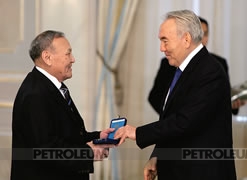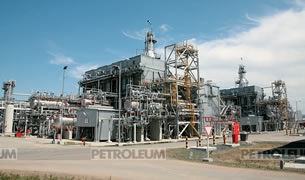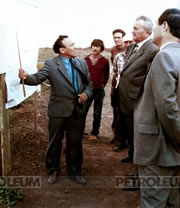Oil Generals
The Discoverer
Galya GalkinaSukhan Maksutovich Kamalov is an explorer and pioneer of the deposits in his native land – the Ural region. He is seventy five today. His glorious biography of a noted scientist, an excellent industrial executive and organizer became part of our country’s history.

All has come from childhood
The future oilman was born in a remote village of Asan-Kuduk, in the Kaztalovsky district, the Western Kazakhstan region. Like many boys of that time, since his childhood he could count only on his own forces. In such a way his personality was shaped: a dashing character, high responsibility, purposefulness and a huge work capacity. In late fifties, when Sukhan Kamalov received his school-leaving certificate, there was no more attractive specialty than geologist. The young man entered the Kazakh State University and after graduation, began his working career in the geological party as a collector.
The sixties

The republic was developing new riches and open spaces, and the youth was captured by the romanticism of professions, so prestigious at that time, needed in the virgin lands. The bright, very active and energetic young specialist rose quickly in his career, though this word was not so popular as nowadays. In the mid-1960s Sukhan Kamalov worked as a chief geologist at the Ministry of Geology of Kazakhstan: he was engaged in planning and designing of all exploration works in the country. Later, a new career turn: a responsible and obliging post of the first deputy chairman of the Republican Committee on Geology and Subsoil Protection. However, his native land has always been in the focus of Sukhan Kamalov’s attention.
Point on the map

From the mid-1970s and up to the early 1990s his destiny was inseparably linked with the prospecting works in the Ural region. Sukhan Kamalov worked as a chief geologist, head of the Ural oil and gas exploration expedition, and general director of Uralskneftegasgeologia Production Association. He has a direct relation to the discovery of the country’s many subsoil "storehouses". But it is Karachaganak that remains to be a vital peak in his biography, if it’s possible to express so. And it was Sukhan Kamalov who put that point on the country’s map where later the countless riches of domestic hydrocarbons have been found out. Where the consortium of the internationally recognised oil and gas majors is developing now the unique oil and gas condensate field Karachaganak.
Popularity
Popularity has come with the discovery of Karachaganak. However, this circumstance has not at all added external solemnity to Sukhan Kamalov. He remains to be accessible and open-hearted. He can patiently explain to the journalists the principles of oil traps action, and on the questions about himself, Sukhan Maksutovich starts to tell about the exclusive merits of the drilling master Sergei Lapshin: «Exactly his well has given the first inflow of gas and gas condensate!» And on the insistent inquiries about the role of Kamalov, he only waves away and again narrates about his colleagues and about the field’s uniqueness: «At all its riches, it is concentrated on a small area, that under development, is of great importance.»
Well ?10
He has foreseen the first inflow of gas and gas condensate on Well ?10 … After all, is not accidental that at the Leningrad Oil Scientific Research Institute he protected his Ph. D. thesis in which theoretically proved the prospects of exploration works in the northern part of the Pre-Caspian hollow by particularly designating the priority areas for prospecting. In such a way he has calculated Karachaganak: instinctively, but also due to cold scientific calculations… Later, already in his doctoral thesis, Kamalov elaborated the scientific grounds for exploration of hydrocarbon fields in the sediments at big depths. And then, convincingly and persistently, Sukhan Maksutovich proved in the "highest" capital offices that exactly the Aral region possesses the enormous hydrocarbon reserves. He proved, risking to incur anger of the higher heads: after all, it were the years when «it was not possible to dare to have one’s own judgement», especially, to object to the high-ranking officials.



